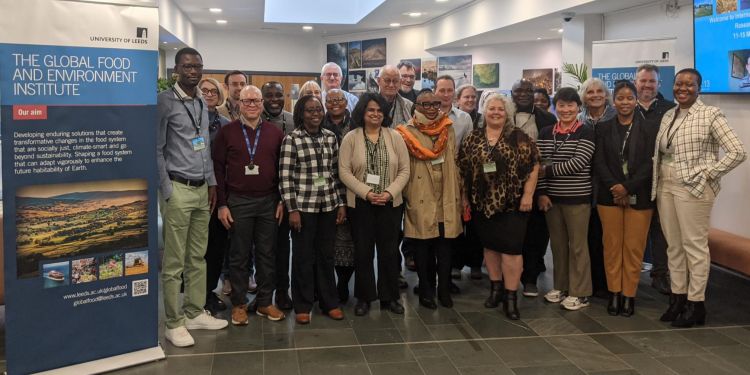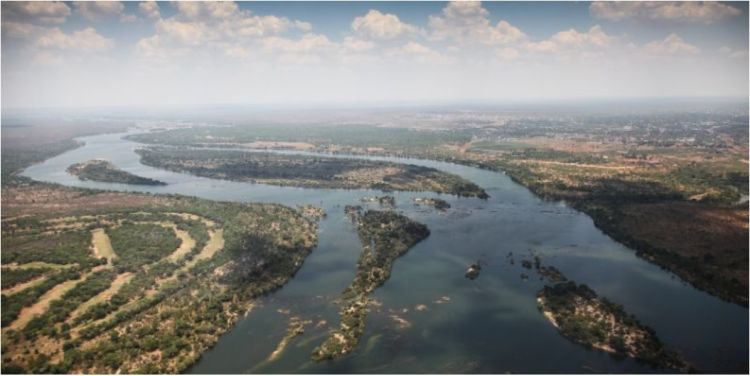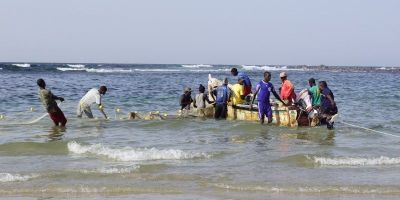Africa Week: research and collaboration highlight

Ahead of Africa Day on May 25, this article highlights recent research projects in which our researchers have collaborated with African communities, researchers and practitioners.
To support people in the countries they work in, researchers must collaborate with local communities rather than working on their behalf.
Local communities, researchers and practitioners have first-hand knowledge of the experiences and challenges in their areas. They know what might and won’t work for them long-term.
In the paper 'Challenges and ways forward for sustainable weather and climate services in Africa' co-authored by Professor Doug Parker, research shows that the international community is spending billions on climate services in Africa. However, the services are only effective if they acknowledge the needs and knowledge of African scientists.
Climate change is a complex, intersecting issue that requires multiple approaches. The consequences of the changing climate, such as extreme weather, natural disasters and food insecurity affect marginalised communities most of all.
Dr Neil J W Crawford at the School of Geography was one of three editors of the book “Climate Justice in the Majority World: Vulnerability, Resistance, and Diverse Knowledges,” which explores the experiences of people facing climate injustice, including in Mozambique and South Africa.
“The book discusses some of the challenges encountered by, in particular, climate justice scholars from (and in) the Majority World,” said the editors.
“Academia, among other places, needs to help address these issues as part of broader processes of decolonizing climate justice research.”
Protecting the Congo Basin Forest

The Congo Basin Forest in central Africa is one of the world’s most important ecosystems.
It's 240 million hectares of contiguous tropical forest and peatland, which absorbs a vast quantity of carbon and helps moderate the impact of global climate change.
Despite this, there has been little investment in research about the Congo Basin Forest compared to the Amazon and Southeast Asian rainforests.
Leading researchers, including Professor Simon Lewis, have launched a major scientific initiative to investigate and protect it.
The Congo Basin Science Initiative will transform our understanding of the Congo Basin, expand the training of scientists from the region and offer essential data to global climate change studies.
- Scientists call for a major investigation into Congo Basin
- Congo peatlands could release billions of tonnes of carbon
- True size of world's largest tropical peatland revealed for the first time
Anticipating extreme weather events

Southern Africa commonly experiences extreme weather; as climate change continues, the region expects to experience more storms.
Over the past few years, the Weather and Climate Information Services Early Warnings for Southern Africa (WISER EWSA) project, with Professor Doug Parker at the School of Earth and Environment, has supported organisations and communities to anticipate extreme weather events.
One of WISER EWSA’s objectives is to build capacity for nowcasting, a process that uses satellite images to predict weather conditions for the next six hours.
This means short-term weather alerts could go out to the pubilc via text messages and smartphone applications.
A testbed in February 2024 brought together meteorologists, scientists, economists and user engagement specialists to evaluate the effectiveness of weather warnings.
Forecasting took place at the offices of the Zambian Meteorological Department (ZMD), the South African Weather Service (SAWS) and the National Meteorology Institute Mozambique (INAM).
- Alerting vulnerable communities to extreme weather
- Southern Africa hosts first ‘testbed’ to improve early warning of thunderstorms
Tracing the risks of malaria transmission
95% of global malaria cases are reported in Africa. Reductions in cases there have slowed in recent years, partly because of fewer international investments in malaria control.
Professor Mark Smith in the School of Geography led a study that created detailed models to predict the risks of malaria transmission.
The research showed that the hot and dry conditions brought about by climate change would decrease the common areas for malaria transmission from 2025.
It found that changes in malaria suitability are more sensitive to future greenhouse gas emissions than previously thought.
The analysis will help to predict areas with high risk of malaria transmission now and in the future, informing national malaria control strategies.
Sustainable fishing solutions

Another consequence of climate change is changing food sources and availability.
For example, as seas warm, fish migrate to cooler waters. This leaves coastal communities that rely on fish struggling to meet their nutritional needs.
AXA Research Fellow Dr Nwamaka Okeke-Ogbuafor researches sustainable food systems in Sierra Leone. The country faces challenges with hunger, malnutrition and wild fish decline from over-exploitation and climate change.
Dr Okeke-Ogbuafor works with local communities and fishers to understand their processes, needs and desires. They work together on solutions that the communities can independently and sustainably use in the future.
Research and policy for food security

The University of Leeds is a partner in multiple initiatives that work towards food security across Africa: Agricultural and Food System Resilience: Increasing Capacity and Advising Policy (AFRICAP); the Food Systems Transformation in Southern Africa (FoSTA) Health Project; The Food, Agriculture and Natural Resources Policy Analysis Network (FANRPAN); and the Consultative Group for International Agricultural Research (CGIAR).
Each of these encompasses several projects that address specific challenges.
A project by Dr Stewart Jennings at the School of Earth and Environment worked on a study that supported African farmers to diversify their crops to improve public nutrition and be more resilient to the changing climate.
Working with FANRPAN, Dr Jennings used the integrated Future Estimator for Emissions and Diets (iFEED) assessment framework to investigate policy options and design a sustainable agricultural system.
The CGIAR Science Centre was announced earlier this year by Prime Minister Rishi Sunak. He said it will “drive cutting-edge research on flood-tolerant rice, disease-resistant wheat and much more.”
One of its projects iSPARK, a collaborative project between the University of Leeds, the Alliance Biodiversity-CIAT and the International Institute of Tropical Agriculture.
iSPARK will combine local knowledge of Kenyan farming with satellite images of food-growing regions to design sustainable improvements to Kenya’s food systems.
Professor Andy Challinor, one of the lead researchers in the project, said: “The databases are a living laboratory and have catalogued new and novel approaches to growing crops.
“We hope to develop new and novel techniques that will enable us to see how effective these different interventions at the farm scale may have been.”
The FoSTA Health project explores food systems transformation for the health of people, animals and ecosystems in Southern Africa through ‘bottom-up processes’.
One of its aims is to empower local farmers and include them in shaping the future of sustainable farming.
FoSTA Health collaborators include organisations and individuals from various sectors and the Food, Agriculture and Natural Resources Policy Analysis Network (FANRPAN) and partners from across Malawi, South Africa, Tanzania and Zambia.
As part of the programme, the Global Food and Environment Institute (GFEI) hosted partners from eastern and southern Africa for International Food Systems Research Week, a research and innovation collaboration opportunity across strategic research, industry and priority policy themes.
- Ensuring nutrition is at the heart of climate-smart agriculture
- Satellite technology to help boost food security in East Africa Building
- Africa’s capacity in food systems
Africa Week at the University of Leeds

The University of Leeds’s Africa Week celebrates African research and innovation, and holds space for discussions about knowledge exchange systems, led and informed by African scholars.





